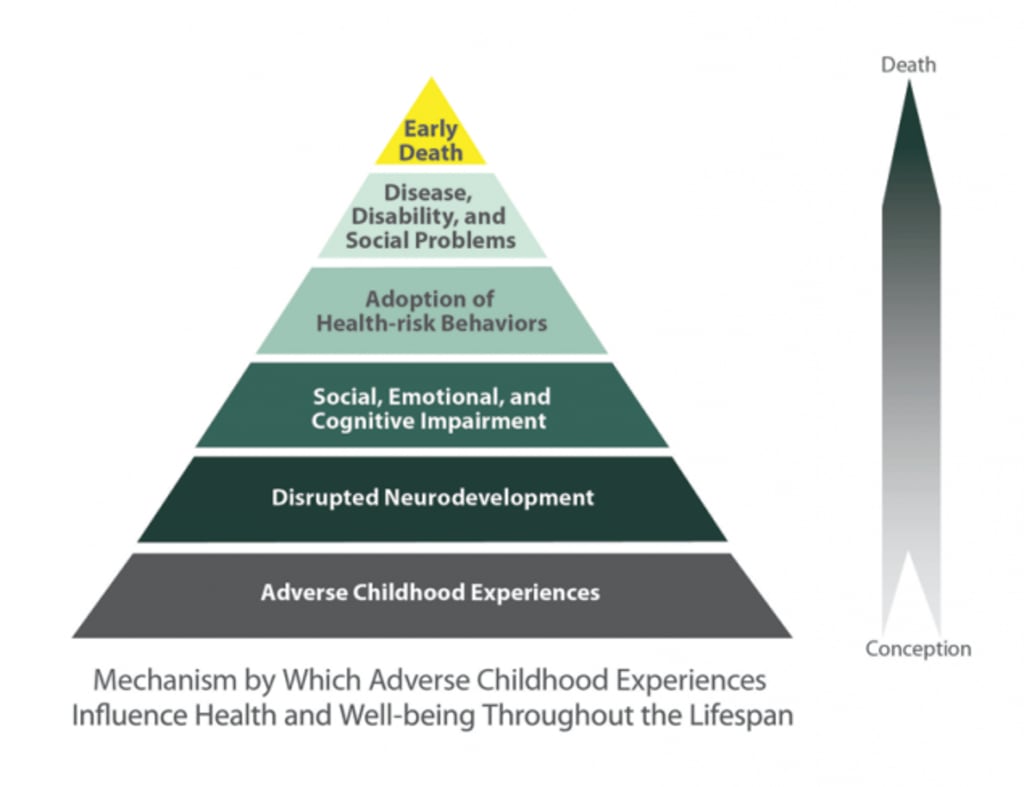The Frightening Consequences of Childhood Trauma
The Long-Lasting Health Effects of Adverse Childhood Experiences

It's no secret that abuse and neglect in childhood cause damage to the child. It's unsurprising that psychological harm could persist for many years. What is less known, though, is the profound connection between negative experiences in childhood and adverse health outcomes in adulthood. The Adverse Childhood Experiences was the first large study to shine a stark light on just how overwhelming this link was.
The ACEs Study
The aim of the landmark Adverse Childhood Experiences (ACEs) study was to understand the relationship between adult health outcomes and the number of adverse experiences sustained during childhood. Between 1995 and 1997, the United States Centers for Disease Control and Prevention (CDC) and the managed care consortium Kaiser Permanente gathered data from over 17,000 adult patients in California. That data was the basis of the initial findings, and data collection by the CDC has been ongoing to shed further light on the damaging effect of ACEs.
All of the study participants were asked whether they had any of the following adverse childhood experiences:
- emotional abuse
- physical abuse
- sexual abuse
- emotional neglect
- physical neglect
- domestic violence in the household
- substance abuse in the household
- mental illness in the household
- criminal household member
- parental separation or divorce
Two-thirds of participants reported at least one ACE, while one in five experienced ≥3. 12.5% of participants had a heartbreaking four or more ACEs. Physical abuse and household substance use were the most common ACEs reported overall. 24.7% of women and 16% of men reported sexual abuse as children.
Effects on Adult Health
The data demonstrated a dose-response curve, meaning the higher the number of ACEs the greater the risk of healthy complications. ACEs are also associated with a number of high-risk behaviours or psychosocial circumstances, and the increase in risk is substantially higher than would be expected in an individual without ACES in those same circumstances.
Some of the ACE-associated consequences were:
- Alcoholism and alcohol abuse
- Chronic obstructive pulmonary disease
- Depression
- Fetal death
- Health-related quality of life
- Illicit drug use
- Ischemic heart disease
- Liver disease
- Poor work performance
- Financial stress
- Risk for intimate partner violence
- Multiple sexual partners
- Sexually transmitted diseases
- Smoking
- Suicide attempts
- Unintended pregnancies
- Early initiation of smoking
- Early initiation of sexual activity
- Adolescent pregnancy
- Risk for sexual violence
- Poor academic achievement
The extent of these effects is staggering. Someone with an ACEs score has a 3000% higher likelihood of suicide and will die 20 years before their peers.
The ACEs study makes it abundantly clear that one of the most important things we can do to protect the health of the population is to protect the children of our society. It all sends a clear signal to health care providers to consider the factors that may be contributing to their patients' health. It's never acceptable to dismiss a patient as "just" an alcoholic who brought on their own liver disease. If that patient grew up in a home with an alcohol parent who physically abused the other parent and the patient while drunk, and then one day took off without a trace, that ACE score of 4 means that patient's own level of risk went through the roof.
We can't prevent health problems if we're trying to intervene when people are well on their way to disease. Interventions needed to be targeted at children and their families to prevent the ACE-loaded gun situation in the first place. Making sure the appropriate family supports are in place to prevent ACEs from happening in the first place is a crucial element in promoting population health in the generations to come.
If you're interested in learning more, you can check out the CDC's Adverse Childhood Experiences study page.
Source
Centers for Disease Control and Prevention. (2016). About the CDC-Kaiser ACE Study.
About the Creator
Ashley L. Peterson
Mental health blogger | Former MH nurse | Living with depression | Author of 4 books: A Brief History of Stigma, Managing the Depression Puzzle, Making Sense of Psychiatric Diagnosis, and Psych Meds Made Simple | Proud stigma warrior






Comments
There are no comments for this story
Be the first to respond and start the conversation.